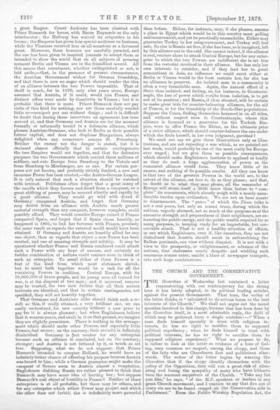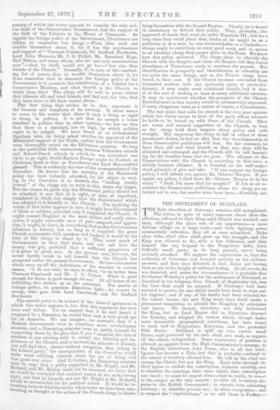THE CHURCH AND THE CONSERVATIVE GOVERNMENT.
THE Guardian of Wednesday last contained a letter remonstrating with our contemporary for the strong tone it has lately adopted, in its political leading articles, against the present Government. That tone, the writer of the letter thinks, is "calculated to do serious harm to the best interests of the Church." We shall not argue out the moral question involved in this charge, because that has been done by the Guardian itself, in a most admirable reply, the drift of which may be gathered from a single sentence :—" When a man finds himself specially in trust with religious in- terests, he has no right to sacrifice them to supposed political expediency ; when he finds himself in trust with political interests, he has no right to sacrifice them to supposed religious expediency." What we propose to do, is rather to look at the letter as evidence of a tone of feel- ing, very common we suspect, among the clergy, and those of the laity who are Churchmen first and politicians after- wards. The writer of the letter begins by warning the Guardian that if the clergy identify themselves with the policy of the Opposition, they will run a great risk of alien- ating and losing the aympathy of many who have hitherto been the warmest supporters of the Church. "Take any list you like," he says, "of the M.P. speakers or leaders in any great Church movement, and I venture to say that five out of every six are to be found ranged on the Conservative side in Parliament." Even the Public Worship Regulation Act, the
passing of which the writer appears to consider the only seri- ous fault of the Conservative Government, had the support of the bulk of the Liberals in the House of Commons. As regards the foreign policy of the Government, Churchmen are bidden ,to remember two things :—First, they need not trouble themselves about it, for it has the acquiescence and support of "Viscount Cranbrook, Sir Stafford Northcote, Lord John Manners, Mr. J. G. Talbot, Mr. Beresford Hope, Earl Nelson, and many others, who are not only conscientious men "—that, by itself, would not go far—" but also firm friends of the Church." Secondly, if, in spite of this comfort- ing list of names, they do trouble themselves about it, let
them remember that to denounce the foreign policy of the Government is to promote the substitution of a Liberal for a
Conservative Ministry, and what benefit is the Church to derive from this ? The clergy will do well to pause before they alienate old and tried friends, and find out, too late, that they have none to fill their vacant places.
The first thing that strikes us in this argument is the honesty and simplicity of its avowals. It never seems to occur to the writer that there is such a thing as right' or wrong in politics. It is not that he accepts a lower standard in politics than in other matters,—he has no idea that there is a standard, low or high, by which politics ought to be judged. We have heard of an ecclesiastical dignitary who, on being asked whether he approved of the Ministerial support of the Turks, replied that the Government were thoroughly sound on the Education question. So long as the particular little controversy between Voluntary schools and School-Board schools in which he was interested was likely to go right, South-Eastern Europe might be Turkish or Christian, bond or free, as Providence and Lord Beaconsfield pleased. This is evidently the view of the correspondent of the Guardian. He knows that the morality of the Ministerial policy has been violently attaoked, for his object in writ- ing to the Guardian is to beseech the "leading weekly journal" of the clergy not to write in this strain any longer. But the reason he gives why the Ministerial policy should not be attacked is not that it is right, or wise, or expedient, considered in itself, but simply that the Government which has adopted it is friendly to the Church. For anything the writer of this letter appears to care, it inigikt be a Government of idiots or robbers, provided only it supported the Church. It might commit England to the most useless and costly enter- prises, it might undertake wars of pure conquest and aggres- sion, it might, in short, do everything that makes Governments infamous in history, but so long as it supplied the great Church movements with speakers and leaders, it would be the duty of the clergy to stand by it. They must speak of Governments as they find them, and not ask how the money was got, provided that a sufficient proportion of it is given to pious uses. In the present case, however, the writer hardly needs to tell himself that the Church has prospered under the present Government. He has a barometer which sums up all the indications of the weather in certain names. 'I do not wish,' he says, in effect, 'to be better than Viscount Cranbrook and Mr. J. G. Talbot. What is good enough for them, is good enough for see., Of all forms of in- fallibility, this strikes us as the quaintest. For modes of foreign policy, let graceless Dissenters fight ; he cannot be wrong, who goes with Lord Cranbrook and Sir Stafford Northoote.
The second point to be noticed is the blissful ignorance in which this writer appears to live that this argument has ever been used before. Yet we suspect that if he had heard it employed by a Dissenter, he would have had a very quick aye for its demerits. We can imagine, for example, that if a Radical Government were to introduce some revolutionary measure, and a Dissenting minister were to justify himself for supporting them by the plea that if you "examine the hated speakers at any meeting held to curtail the liberties and im- portance of the Church, and to forward the interests of Dissent, you will find that, almost without exception, they belong to the Liberal party," the correspondent of the Guardian would make some edifying remarks about the sin of doing evil that good may come. And if, further, the Dissenting minister were to urge that a poliey supported by Mr. Bright, and Mr. Richard, and Mr. Morley could not be immoral, we fancy that he would be reminded that eminent names do not make 'wrong right, and that he himself, and not Mr. Bright or Mr. Richard, would be accountable for his political action. It would be in- teresting to know what the writer whose letter we have been com- menting on thought of the action of the French clergy in identi- lying themselves with the Second Empire. . Clearly, he is bound in consistency to defend their policy. They, probably, dis- approved of much that went on under Napoleon III., but for .a long time they could plead that, faulty as he might be as a politician or as a man, he was irreproachable as a Catholic,— always ready to contribute to every good work, and to secure to an obedient clergy their proper place in the State. We know how this policy answered. The clergy chose to identify the Church with the Empire, and when the Empire fell therfound abundance of Frenchmen ready to continue the process. But identification in prosperity and identification in adversity are not quite the same things, and so the French clergy have found, to their cost. If the Church becomes associated from interested motives with any particular party or particular dynasty, it may make some additional friends, but it does so at the cost of making at least as many additional enemies. It may be questioned whether the prospects of the Church Establishment in this country would be permanently improved, if every clergyman were, as a matter of course, a Conservative.
The last point that calls for remark is the very poor opinion which this writer seems to have of the party whose interests he holds to be bound up with those of the Church. They are warm and staunch supporters of the Church, so long as the clergy hold their tongues about policy and vote straight. But supposing the clergy to fail in either of these paramount duties, he has no idea that the claurchmanship of these Conservative politicians will last. On the contrary, he fears that, old and tried friends as they are, they will be alienated and estranged, and the Church will be left lament- ing for the familiar faces that are gone. The alliance of the Conservatives with the Church is, according to this view, a strictly business alliance. It is founded on the well under- stood principle of give and take. "If you support my foreign policy, I will defend you against Mr. Osborne Morgan. If you oppose my policy, I shall leave Mr. Osborne Morgan to do his worst." " Doth Job serve God for nought ?" If Job at all re- sembled the Conservative politicians whom the clergy are ex- horted not to vex, the answer must have been,—Certainly not.



































 Previous page
Previous page